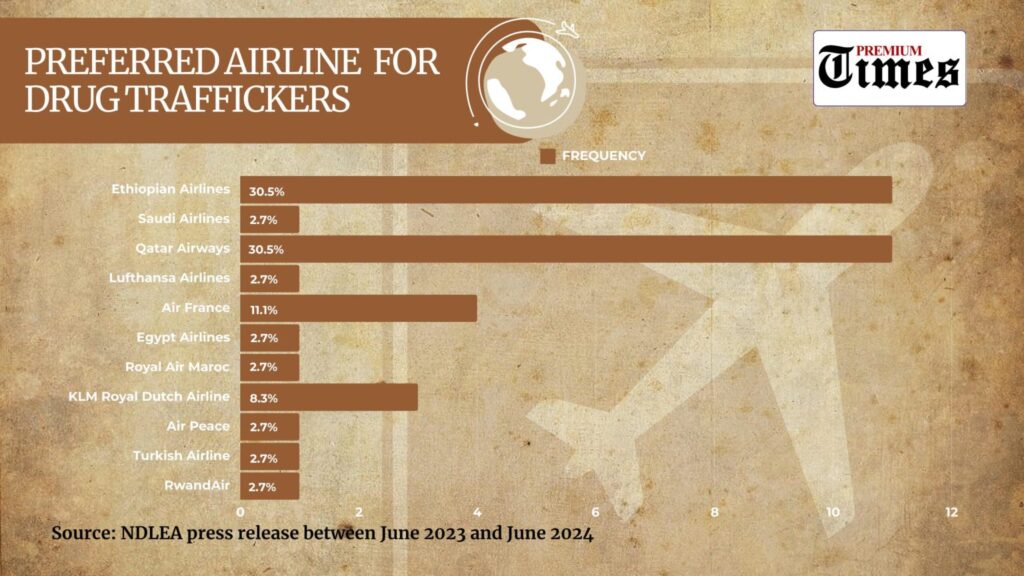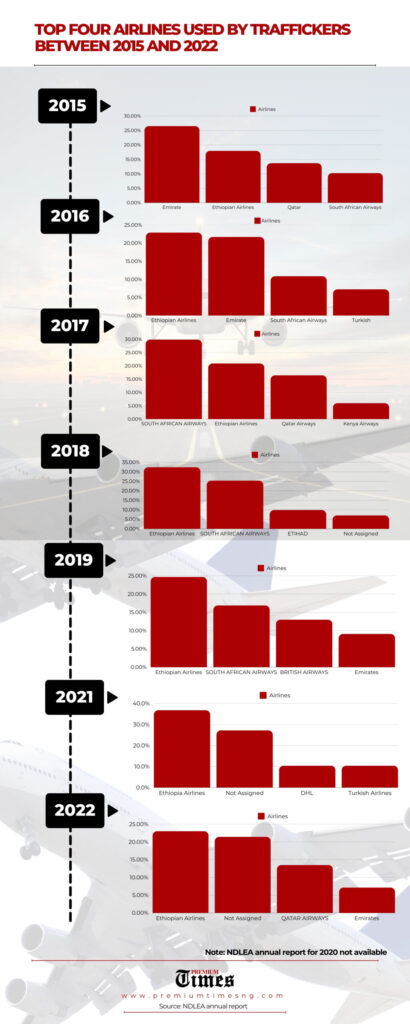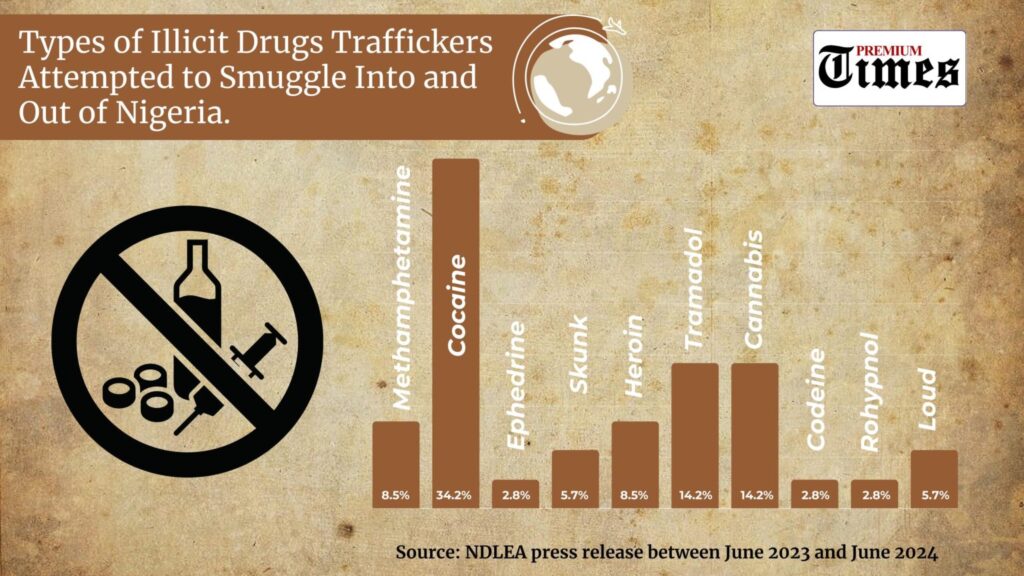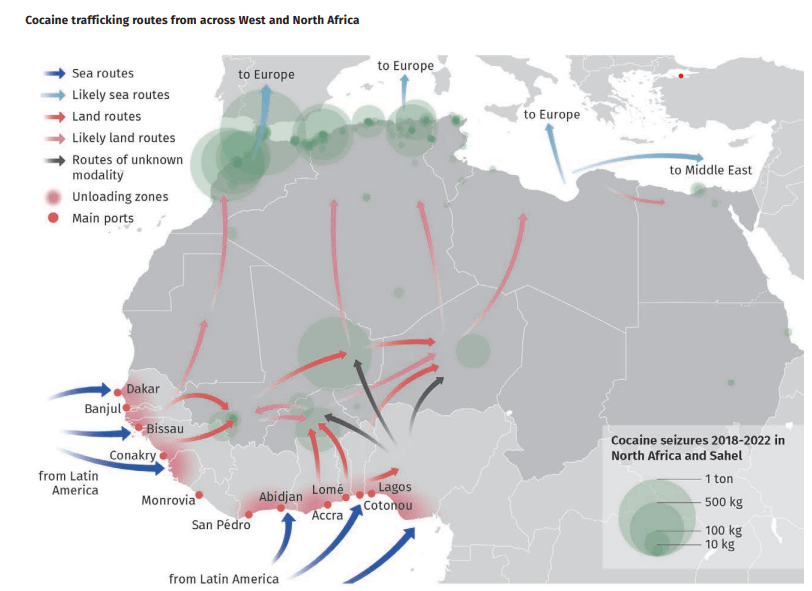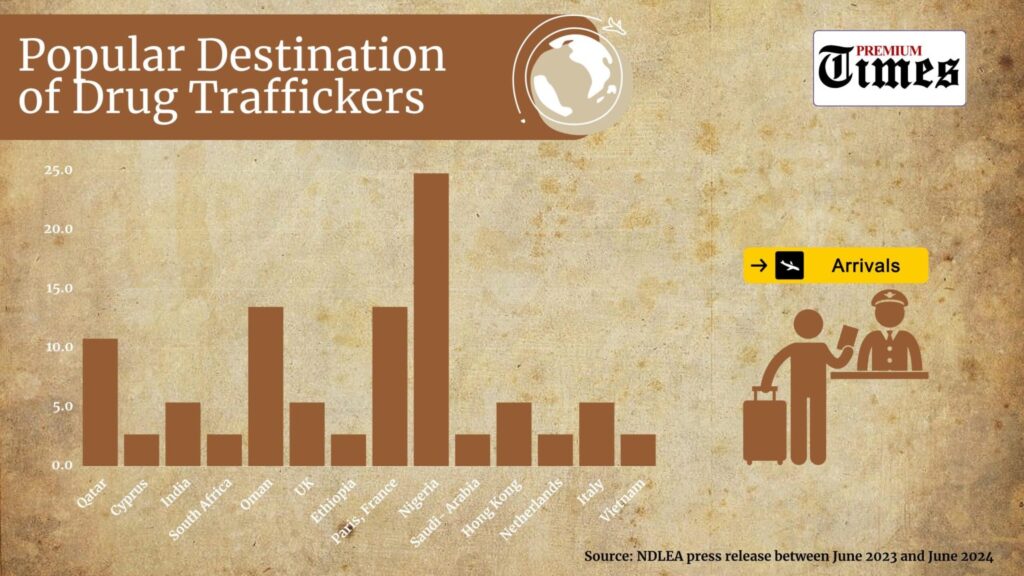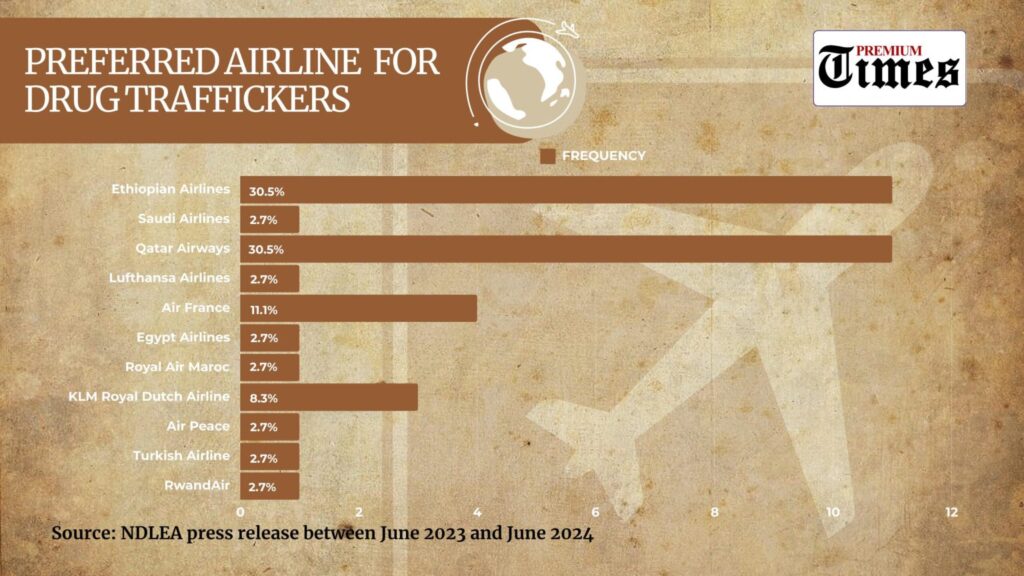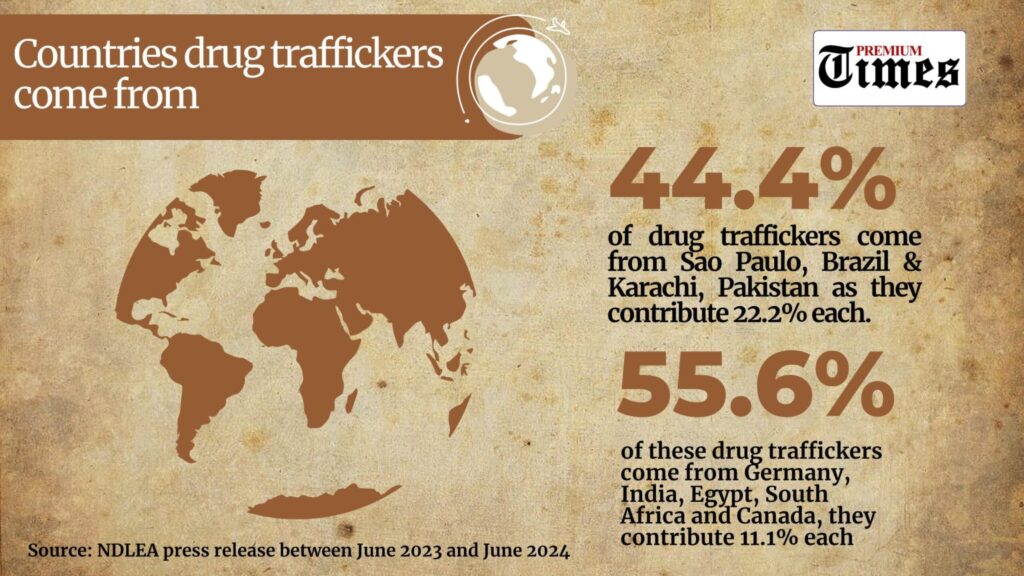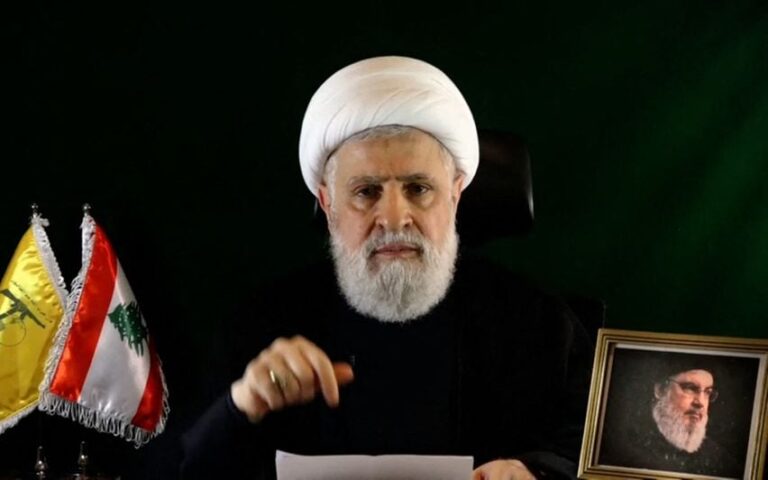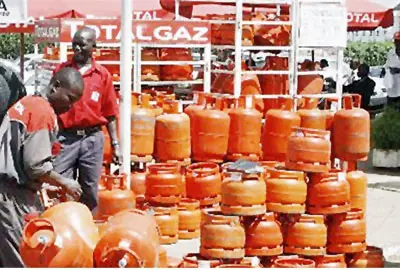
The day was 1 August 2023. Christian Uwaezuoke, one of Nigeria’s notorious drug traffickers, arrived at the Murtala Muhammed International Airport, Lagos to board his Ethiopian Airline flight to India. Of average height, nothing about the 43-year-old businessman stood out from the rest of the passengers, but a body scan would reveal something different.
Checks by airport security showed that Mr Uwaezuoke had ingested 1.822 kilogrammes of cocaine. Further investigations revealed that not only had he used a passport reflecting a false identity, but he was also on the police wanted list after jumping bail more than a year before.
Earlier in March 2022, Mr Uwaezuoke had been arrested at the Nnamdi Azikiwe International Airport, Abuja, by the National Drug Law Enforcement Agency (NDLEA) during the inward clearance of another Ethiopian Airlines flight from Addis Ababa, Ethiopia. He was found to have ingested cocaine weighing 2.243 kilogrammes.
He was later granted bail but jumped bail.
Following his arrest in August 2023, he was re-arraigned on March 20 at the Abuja Division of the Federal High Court, presided over by Justice Joyce Abdulmalik. After considering his lack of remorse, the gravity of the drug-related offences, and his status as a repeat offender, Justice Abdulmalik delivered a guilty verdict and sentenced him to life imprisonment.
Mr Uwaezuoke’s arrest and conviction is one of thousands documented in press releases and published by the NDLEA on its official website.
The press releases contain details such as the names and nationalities of the suspected drug traffickers, the type and weight of the narcotic drugs and psychotropic substances, the drug concealment strategy, as well as the airline and airport used by the inbound or outbound trafficker.
PREMIUM TIMES examined these press statements for the year between June 2023 and June 2024. We curated the data on every arrest announced by the agency and found some interesting patterns.
Analysis of the data showed that Ethiopian Airlines and Qatar Airways were the most commonly used airlines among arrested drug traffickers. Notably, out of 36 drug suspects arrested at airports by NDLEA during the review period, 11 (30.5 per cent) had tickets for Ethiopian Airlines, same for Qatar Airways, indicating a significant presence of drug trafficking activity on these carriers.
Ethiopian Airlines operates from Addis Ababa and is the largest airline in Africa, operating more than 125 destinations, while Qatar Airways flies to over 170 international destinations across five continents.
Interestingly, this is not the first time this trend has been observed. NDLEA’s annual report for 2015 to 2022 shows Ethiopian Airlines among the top four airlines used by drug traffickers at the Murtala Muhammed International Airport, Lagos. Further analysis indicates that in 2016, 2018, 2019, 2021, and 2022, the airline topped the list of airlines used by drug traffickers at the Lagos airport.
Questions have been raised regarding the frequency at which drug traffickers use certain international operators. Nigeria’s rising influence in the illicit drug trade has also fueled a national concern. Why do drug traffickers prefer to fly certain airlines, what can an airline do to mitigate drug trafficking, and are airlines liable when drug traffickers use their flights?
Audience Survey
The Director of Media and Advocacy of NDLEA, Femi Babafemi, explained that drug barons patronise airlines that regularly fly on their drug routes and provide connecting flights to their final destinations.
He said these connecting flights are crucial due to the trafficking strategy used by drug barons to avoid detection by drug enforcement agencies.
“These traffickers move in Zig-Zag; they don’t move straight. For instance, a consignment may come from Brazil to Nigeria and ultimately still find its way to Europe, Asia, or even the Americas. So it’s the route that they are likely going to use,” he stated.
The Global Report on Cocaine 2023, released by the United Nations Office on Drugs and Crime (UNODC), explained this phenomenon better. The report states that large airlines with direct connectivity to a large number of destinations play a crucial role as transit points for drug trafficking on passenger flights.
“In the case of trafficking into and out of Nigeria, one interviewee indicated that these hubs include airports in Ethiopia, Qatar, and the United Arab Emirates, corresponding to hubs of airlines offering connectivity between South America and Africa.
“Based on analysis of the itinerary of 150 mules on passenger flights who were arrested during August 2020-May 2021 while trafficking drugs into, or out of, Nigeria or Benin, (respectively from Brazil, or to Europe) Addis Ababa (Ethiopia) emerged as a particularly frequent transit airport,” the report stated.
Between airlines, staff and drug traffickers
But there is more.
In a bare-it-all interview with PREMIUM TIMES, a former drug trafficker, Felix Johnson (not real name), disclosed that while traffickers often undertake feasibility studies on the best route, airline, and airport that guarantee a successful trip, some international carriers are drug traffickers’ favourite because of their perceived slack security measures.
“The route determines the airline we board. We choose a flight route that gives at least a 90 to 95 per cent guarantee that any drug we traffic will not be detected. We also prefer to board transit flights that board and leave immediately. Keeping luggage containing illicit drugs around the airport for days could be dangerous.
“Some airlines know what is going on. Because the airline brings a lot of income, they train their workers to relax the security protocol. Their security check-in are very free. As long as the drug is not obvious, they allow you to go,” Mr Johnson claimed.
Asked why drug trafficking is thriving despite several arrests by the NDLEA, Mr Johnson explained that deep-seated corruption and the country’s deteriorating economy have pushed many into crime.
“The problem is that everyone is corrupt. Even airline officials, air hosts and hostesses and even pilots are corrupt, but you will not know. We have pilots that will take the drugs into the airplane and we will pick it up from them after boarding.
“Many Nigerians still go into drug trafficking because of desperation to get wealth at any cost. The bad economy does not make the situation better,” he added.
Mr Johnson regularly trafficked illicit drugs like heroin to the Asia-Pacific region. For more than a decade, he carefully managed his illegal business and maintained a home front with his wives and children. Everything went smoothly until his arrest in 1998 by the police in Thailand.
“We were four in a house in Bangkok when we were busted by authorities. In the process of flushing the heroin, the toilet overflowed and blew up all over my body. I plead guilty because there was evidence on me,” the former trafficker told PREMIUM TIMES.
In 2007, Mr Johnson was repatriated to Nigeria under the Prisoner Transfer Agreement (PTA). In 2002, Nigeria signed a treaty on the transfer of offenders and cooperation in enforcing penal sentences with Thailand.
Mr Johnson was incarcerated for 22 years, including nine years in a Thai prison and 13 years at the Kirikiri Maximum Security prison until his release in December 2020. Since then, the 65-year-old said he has left the life of crime and rebuilt his life.
The NDLEA’s Director of Media and Advocacy, Mr Babafemi, confirmed that some airlines have been reprimanded for recording a high number of drug traffickers on their flights.
Although he did not mention the name of any airline, he said his agency had issued a warning to international carriers regularly flown by drug traffickers.
“Two years ago, we wrote one of the airlines, warning them that they have the responsibility to also ensure that they put the necessary checks in place at the point of their departure. Otherwise, we will be compelled to enforce some aspect of the law. The airline wrote back and made some commitment and there was some kind of improvement thereafter,” Mr Babafemi told PREMIUM TIMES.
What the law says
Mr Babafemi was referring to section 25 of the National Drug Law Enforcement Agency Act, 2004, which states, “It shall be the duty of every commercial carrier to take reasonable precaution to: (a) ensure that its means of transport are not used in commission of offences under this Act; (b) Comply with appropriate security measures at points of entry and exit in the Federal Republic of Nigeria and other Customs control areas to prevent unauthorised cargo in its means of transportation.
“Such precautions as are referred to in subsection (1) of this Section shall include (a) the training of personnel to identify suspicious consignment or persons. (b) promotion of integrity of their personnel; (c) submission of cargo manifest advance; (d) use of tamper-resistant individually verifiable seal or containers. (e) reporting to the agency at earliest opportunity all suspicious circumstances relating to drug trafficking,” the Act added.
The Act prescribes a fine not exceeding N100,000 for airlines that infringe this law.
We shared our findings with the management of Ethiopia Airlines and Qatar Airways.
Qatar Airways did not respond to our requests for comments.
The area manager for Ethiopian Airlines in Lagos, Wondwossen Beyene, explained that if the airline recorded the highest number of drug traffickers on its flight, it was due to its higher passenger traffic than other airlines.
Mr Beyene is right in terms of absolute numbers of passenger traffic. In its Q1 2023 executive summary, the Nigerian Civil Aviation Authority (NCAA) reported that Ethiopian Airlines led the way in international and domestic flight operations, with the highest number of air passenger movements between January and March 2023. The airline recorded a total of 127,247 passengers, which is 14.6 per cent of the total 870,776 international passengers over that period. The Ethiopian airline figures comprise 51,320 inbound and 75,927 outbound travellers, making it the top carrier for the quarter.
The airline also refuted the claim that it was complicit in the drug trafficking trade in Nigeria. It stated that “Ethiopian Airlines performs rigorous training to its staff and adheres to strict ethical standards to ensure compliance with all laws and regulations. We have strict policies in place to prevent any such behaviour. These are the reasons why the Airline believes that this is a mere allegation.”
In a previous interview with ICIR, the general manager of Ethiopia Airlines in Nigeria, Shimeles Arage, explained that airlines are not responsible for airport security and so should not be blamed when drug traffickers choose to fly with them.
“This can happen to any airline and (has) nothing to do with the airline. Rather, we are working hand in hand with (the) authorities to curb such activities. Security and bag screening is not controlled by airlines. The security and scanning of passengers are not done by the airline.
“The airline does not own the scanning machines and only passengers that have been screened are allowed to board the airline. The airline only carries passengers that have been screened and cleared by other agencies,” he added.
But an aviation expert, John Ojikutu, holds a different opinion. He says both the airport and the airline share the responsibility of ensuring that hard drugs are not trafficked in or out of the country.
“The airlines have their security programme just like the airport has their security programme. If the airline has confidence in the airport security, fine, but if they do not, the regulation allows them to do secondary screening because the final responsibility is still on the airline.
“So what is the security programme of these airlines? Did the NCAA approve it? Are they doing something contrary to what they submitted to the NCAA? That’s the question we should be asking now, and when they violate it, what do we do, especially when they carry drug traffickers into Nigeria?” he queried.
In 2019, Abike Dabiri-Erewa, who was the Senior Special Assistant to the President on Foreign Affairs and Diaspora, accused two foreign airlines of enabling drug cartels at Nigeria’s international airports.
Mrs Dabiri-Erewa made the allegations when she appeared before a Senate ad-hoc committee set up to look into circumstances that led to the arrest of Zainab Aliyu in Saudi Arabia over alleged possession of a banned substance, Tramadol.
We are withholding the names of the airlines because Mrs Dabiri-Erewa did not pprovide empirical evidence to back her allegations.
Drug traffickers and cocaine trafficking in Nigeria
Further analysis of NDLEA’s press statements indicates that cocaine is the most trafficked narcotic drug in Nigeria. At 34.2 per cent, cocaine topped the list of drugs trafficked in and out of the country during the period. Tramadol, Cannabis, and Methamphetamine followed.
Based on UNODC’s report, drug traffickers are giving Nigeria a bad name
Although the operation of Nigerian drug traffickers is limited to mid-level and dealer levels rather than large-scale trafficking, Nigerians account for the most arrests for individual cocaine seizures in Europe between 2018 and 2020.
A large chunk of the cocaine comes in from Brazil in small quantities through mules on passenger flights. It is then distributed to sub-regional countries like Burkina Faso, Mali, Niger, Ghana, Senegal, and Liberia. The transit countries are Algeria, Ethiopia and Morocco.
The drug routes also extend to the Asia-Pacific region. The destinations are Australia, China, Hong Kong, India, Malaysia and Sri Lanka. In the Near and Middle East/South-West Asia, the destinations are Pakistan, Saudi Arabia and the United Arab Emirates and in Europe, Türkiye and the United Kingdom.
“Seizures made at destination (outside of Nigeria) were predominantly cases of trafficking by air, while seizures made in Nigeria itself included predominantly trafficking by mail or express parcel as well as commercial flights, aside from a minority of cases involving vehicles,” the report stated.
Preferred destination of drug traffickers
Analysis of NDLEA data shows that within the period under review, more drugs were trafficked into the country than were trafficked out. At 24.8 per cent, Nigeria emerged as the top final destination of drug traffickers arrested by officers of the agency, closely followed by Paris, Oman and Qatar.
Unsurprisingly, Nigeria’s busiest airport, the Murtala Muhammed International Airport in Lagos, is the preferred departure airport of choice in Nigeria. It was closely followed by Nnamdi Azikiwe International Airport, Abuja and Mallam Aminu Kano International Airport (MAKIA), Kano.
Meanwhile, Brazil and Pakistan are the top countries Nigerian drug traffickers fly in from.
Curbing drug trafficking
The National Drug Law Enforcement Agency (NDLEA) is leading Nigeria’s fight against drug trafficking and drug use. While the agency has made commendable efforts, experts say more must be done.
Patrick Agbambu, a security expert, said drug couriers are always devising new means of trafficking drugs in and outside the country.
“Unfortunately, it seems like all the efforts of the government through the NDLEA have not yielded much result. So, the government must intensify efforts at social orientation. Also, enforcement has to be backed up with speedy prosecution of those caught in the Act. This is because many Nigerians believe that how you make the money does not matter,” he stated.
In May, the Senate proposed the death penalty for persons convicted for manufacturing and processing dangerous drugs as well as drug trafficking. The move, according to the lawmakers, will strengthen the fight against drug trafficking and drug use in Nigeria. (PREMIUM TIMES)
